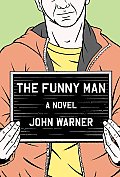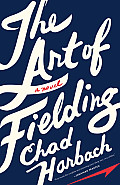
There is a debut novel out this fall that has been getting a lot of attention. Unfortunately, I didn't write it. Following its excerpting in
Sports Illustrated and being the subject of a 10,000-(or-so)-word profile in
Vanity Fair, Chad Harbach's
The Art of Fielding became a national bestseller in the first week of its release. Prior to all of this,
The Art of Fielding spawned the funniest headline not written for the
Onion when Bloomberg reported on the sale of the book to publishers by saying, "Unemployed Harvard Man Sells Novel for $650,000."
The cynic would say that all the subsequent attention for Harbach's novel is driven by that very large number (which was actually $665,000), except that if the cynic has actually read the book (as I have), he'd realize that The Art of Fielding is completely charming from the first word to the last, somehow combining a baseball book with a campus novel, all the while mixing in two significant love stories and a buddy comedy. I read it in a day six weeks prior to its release, ignoring any and all other responsibilities, and after closing the back cover remarked in my own head something along the lines of "Well, duh, of course it's going to be huge, who couldn't see that coming?"
Except as the Vanity Fair article (written by Harbach's friend and co-editor at literary/commentary journal N+1, Keith Gessen) makes it clear, this publishing phenomenon was a long time in the making. Harbach had taken 10 years to write the book, working off and on, during and between jobs that kept him just afloat financially. Gessen himself read early drafts of the novel, and doubted it would amount to much when (or if) Harbach finished it. Dozens of agents passed on the manuscript that would ultimately start a bidding war among the biggest and most prestigious publishers in the world.
The Art of Fielding is, officially, a publishing "miracle." Harbach has achieved every aspiring writer's dream.
I read Gessen's article on his friend's book with great interest, both because I am a fan of The Art of Fielding, and because I am the author of a debut novel (The Funny Man) released in September 2011 that sold for an advance considerably smaller than $665,000, and what struck me mostly is not how amazing Harbach's journey to publication is, but rather how typical. Except for that advance, Harbach's story is just about every first novelist's story, years of toil in obscurity, agents who regretfully pass, near misses at publishers, mountains of failure mixed with molehills of success.
I went asking some writer friends about this to confirm my suspicions, and it turns out I'm right. My friend Jessica Francis Kane (The Report) took 10 years to write her novel from idea to completion, during which she birthed two children and moved three times. Over a 10 year period, T. J. Forrester (Miracles Inc.) lived in the attic of a Virginia rooming house, roasting in the summer, freezing in the winter ("I often sat in my sleeping bag while I wrote."), during which he not only taught himself how to write, but managed to produce two manuscripts, which ultimately landed him a multi-book deal with Simon & Schuster. My good friend and frequent collaborator Kevin Guilfoile (The Thousand) got up at 5 a.m. every day for years to work on a novel that he wrote to completion before deciding it wasn't any good, and then starting over again on what would become his first published novel, Cast of Shadows.
 Stephen King wrote three full novels before publishing his fourth, Carrie. Carrie started as a short story that King trashed after three pages only to be rescued from the garbage by his wife who encouraged him to finish it. Before publication, he was reportedly so strapped for cash that he asked to have his phone disconnected.
Stephen King wrote three full novels before publishing his fourth, Carrie. Carrie started as a short story that King trashed after three pages only to be rescued from the garbage by his wife who encouraged him to finish it. Before publication, he was reportedly so strapped for cash that he asked to have his phone disconnected.
I even have a number of other writer friends and acquaintances who have written what I consider to be brilliant novels for which they can't find representation or any offers of publication.
I share these tales not to diminish Harbach's dedication and achievement, but to point out that on some level every book contains a bit of a miracle. You sometimes hear writers talk about how "hard" writing is, but, to me, this is the wrong word. Writing is "difficult" in that doing it well takes time and effort and is often laced with frustration, but as work it is not "hard" in the way so many other jobs are. If it were, you wouldn't see all these people doing it for so little external reward.
Every book that makes it into the world faces some daunting odds, and its arrival in front of readers should have and could have been derailed at any given moment. Effort and diligence and, yes, talent helps, but luck plays more than its part in most cases.
I write about this in The Funny Man. The main character, a stand-up comedian, gets famous and then rich on a stupid gimmick, doing impressions with his hand shoved all the way inside his mouth. As he becomes more and more famous, the funny man very briefly wrestles with the idea that his success is the product of a fluke, before convincing himself to ignore this inconvenient fact and deciding that he is blessed with a special genius. Things do not go particularly well for him from that point on.
I try to remember my character's story as I obsessively Google myself and my novel, reading the virtual tea leaves for some intelligence about the fate, sales-wise, of my book. When something takes 10 years to reach fruition, the stakes begin to feel high. As a writer, I've achieved more than I ever wished for, and yet, at each milestone, I seem to come up with some fresh dream. As lucky as I've been to reach this point, I can't help but look past the present horizon for something even better in the distance.
I don't know Chad Harbach, but my hunch is he might be experiencing the exact same thing on perhaps a different scale. Writing a novel requires significant time wandering alone in the wilderness, and it sometimes feels like no amount of validation that that time wasn't wasted can ever be enough. A $665,000 advance speaks loudly, but not necessarily clearly.
There's also that next book to write. I don't think a big advance makes that process any easier.
So here is what I've discovered is the best part about publishing a novel: People read it! No matter if you're Chad Harbach or Stephen King or... me, when your book is released into the world, someone, somewhere will read it, and thanks to the digital revolution, you get to hear from them, be it via emails, or on Facebook, or reviews at GoodReads. And some people don't just read the book, they get it. It speaks to them.
There is a famous quote from Kafka, "The book must be an ice axe to break the frozen sea inside us." In an interview, George Saunders expressed a similar sentiment this way:
I think that what any of us pays for when entering into a reading experience is that feeling of seeing another mind at work, and not at work in a rational way. There's something thrilling about seeing this other mind at work in this blissful and private and self-referential way, and then suddenly your mind joins it. How weird and inexplicable that is. There's a sort of knowledge that goes beyond our mundane everyday knowledge. The reader and writer are being smarter together than either one could be separately. This is like a sort of experiential proof of the fact that our apparent separation is delusional.
Indeed, literature has the unique ability to make us feel less alone. As a reader, I have experienced this more times than I can count. It's probably what taught me to be comfortable enough with solitude in order to go write my own book.
As a writer, I wasn't sure I was capable of bridging this gap, but seeing readers open up to my book is, by far, the most shocking and rewarding part of the experience. It makes me greedy for more.
I bet Chad Harbach and Stephen King would agree with me.